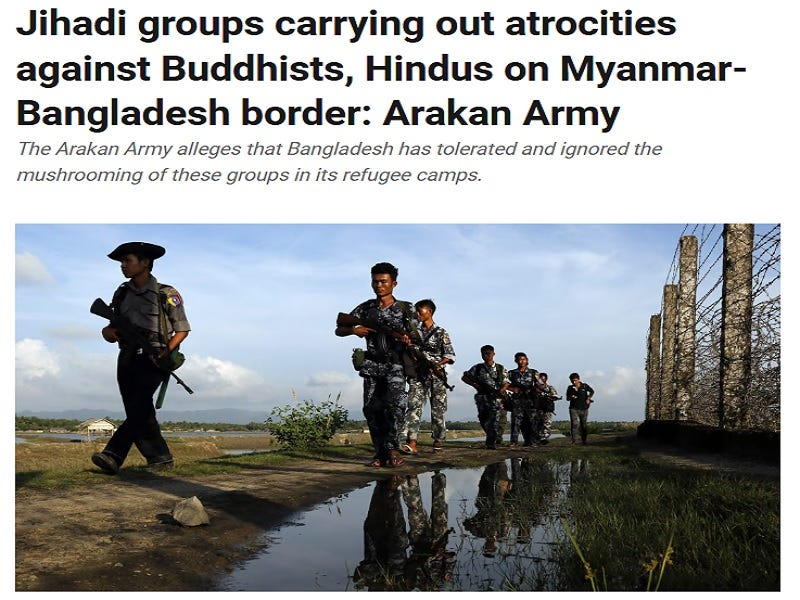China, Pakistan, and the US could take advantage of this to expand their military influence in Bangladesh at the expense of India’s legitimate national security interests.
Lost amidst the news of Syria’s epic collapse was the Arakan Army’s (AA) capture of the Myanmarese-Bangladeshi border last week, which is the first full frontier to fall to rebel forces since the latest phase of the world’s longest-running civil war began in early 2021. Readers can learn more about this conflict’s context here, which links to nine analyses over the past year. It also follows summer’s US-backed regime change in Bangladesh and its worsening ties with India, which can be read about here and here.
The reason why this development is so significant is because the AA previously accused Bangladesh of backing jihadist Rohingya terrorists against their home region’s Buddhists, which a source reiterated in comments to The New Indian Express after taking control of the border. The AA is comprised of Buddhists while the Rohingya are a Muslim minority in Myanmar’s Rakhine State (considered by the AA to be Arakan) who originated from Bangladesh. Their conflict is a thus “clash of civilizations” in a way.
The AA is also regarded as one of the most heavily armed and experienced rebel groups fighting against the Myanmarese military (Tatmadaw), which itself is heavily armed and experienced, thus making its latest victory all the more impressive and posing an even greater latent security threat to Bangladesh. After all, with the Bangladesh Armed Forces (BAF) distracted by the faux threat that they imagine India presents, the AA might consider cross-border strikes against alleged Rohingya terrorist camps.
At the very least, there’s no longer any politically feasible possibility of repatriating the Rohingya so long as the ultra-nationalist AA rules Rakhine State since there are credible fears for Muslim civilians’ safety, all of which could lead to this issue once again attracting international attention in the coming future. It’s highly emotive due to the civilian toll that the Tatmadaw’s prior anti-terrorist crackdowns caused, which critics condemned as ethnic cleansing and genocide, and the public can easily be reminded of it.
Bangladesh’s new US-backed rulers could also exploit this southern border crisis, even just the perception thereof, as the pretext for justifying more high-tech weapons purchases from China and comprehensively expanding cooperation with Pakistan, both of which are India’s traditional rivals. Any eruption of conflict between AA and BAF, including limited cross-border shelling and low-level raids, could also turbocharge Bangladesh’s military ties with the West and the US in particular.
Former Bangladeshi Prime Minister Sheikh Hasina claimed that one of the reasons for her foreign-backed ouster was that an unnamed Western country wanted to punish her for refusing to allow it to open up a military base. Most observers intuited that she was referring to the US. An exacerbation of Bangladesh’s southern border crisis with the AA, possibly spun by Dhaka as “unprovoked genocidal aggression by a Myanmarese-based terrorist group”, could accelerate talks on a US base for “self-defense” purposes.
India would therefore do well to closely monitor developments in this corner of its region since this seemingly minor event in Myanmar’s ongoing conflict could come to have outsized consequences for its security if it’s taken advantage of by China, Pakistan, and the US to expand their military influence there. Such an outcome could lead to more serious Bangladeshi-emanating threats to its Northeastern States with time, thus posing even greater challenges to its territorial integrity and sovereignty.





India has nothing to do with this and will not meddle in Myanmarese-Bangladeshi bilateral affairs, in the same way in which Russia does not interfere in Palestinian-Israeli conflicts. The Myanmarese side alleges that Rohingya radical mercenaries from Rakhine are poised to ethnic cleanse surviving remnants of an earlier holocaust among Buddhist Chakma tribals from Chittagong province of Bangladesh in cahoots with rogue elements in the Bangladeshi armed forces. The Arakan Army faction claims that it plans to secure and seal its country's border with Bangladesh to forestall the likelihood of Rohingya ultras spilling over into Bangladesh from Myanmar. Those Rohingya militants have reportedly received training several years ago from Al Qaeda veterans at the tacit behest of Mossad. On face of it, the Arakan Army's contention of premptive defense appears to be a valid argument, in as much as it has to do with Myanmarese sovereignty within the confines of its international borders. India has no business exerting any pressure on Myanmar. India enjoys fraternal relations with both the people and government of Myanmar and has no reason to fear that glorious nation. India is nobody's cats paw, but those who are interested in poking their nose between two neighbours are always at liberty to jump into the fray on their own. Meanwhile, Israel has effectively told the Palestinians to GFY; and Al Qaeda, not to mention the Saudis plus Jordanians, seem quite reconciled to the spectre of Greater Israel extending from Aleppo to Makkah.
Can't understand how china can take advantage. China has interest in US not securing a base in Bangladesh just like india. It would want Rohingya issue to be a bilateral issue between Myanmar and Bangladesh.
India also doesn't want US base